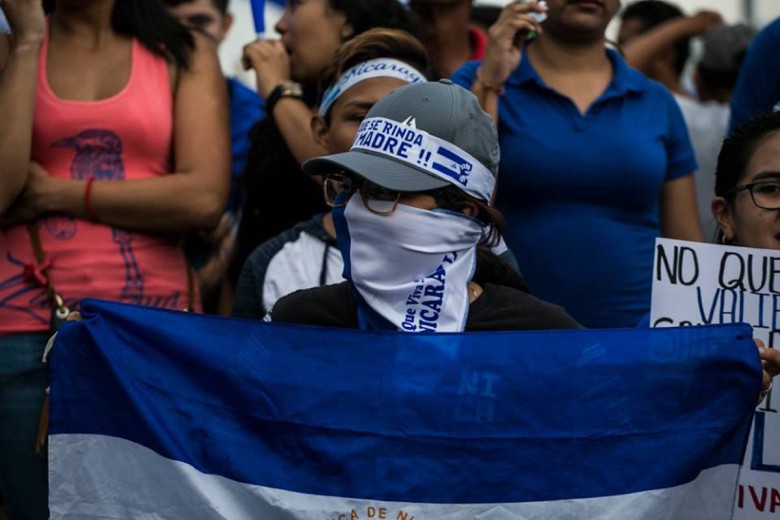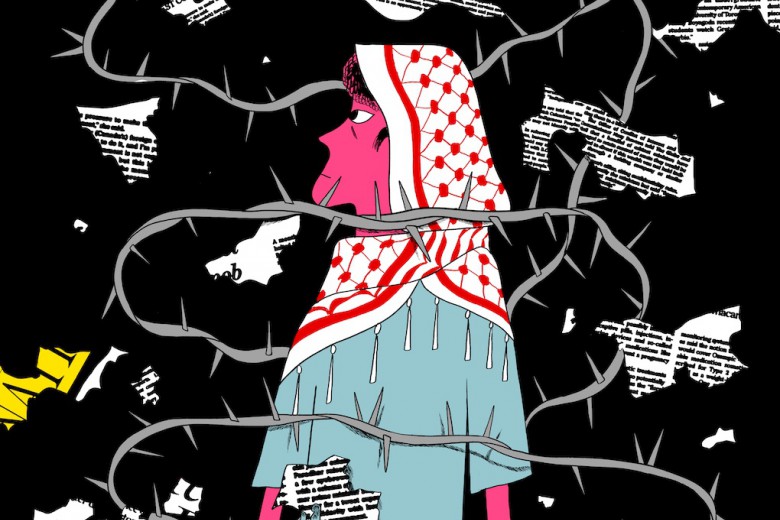
Art by Marie-Anne Beaini
In 2020, CBC Radio One host Duncan McCue publicly apologized for referring to Palestine as “Palestine” while interviewing Joe Sacco about his book Paying the Land. Later, CBC retroactively erased any mention of Palestine from that interview, with executive producer Raj Ahluwalia stating “There was no pressure from anyone [to do so].”
Since the beginning of the escalated genocide in Gaza, traditional media has responded the same way it responded to the so-called “war on terror”: parroting Western foreign policy, encouraging paranoia and fearmongering about the looming threat of so-called Islamic terrorism, and manufacturing consent for unwinnable wars in the Third World.
In October 2023, CTV, the National Post, Toronto Sun, and Toronto Star replicated, with little to no challenge, the quickly debunked claims that Hamas beheaded 40 babies and perpetrated “mass rape.”
While Palestinians in Gaza are being slaughtered, orphaned, maimed, and displaced by Canada-funded weapons, corporate media and Canadian politicians insist that the hundreds of thousands protesting the genocide are violent anti-Semites.
Davide Mastracci, opinion editor at the Maple and previous associate opinion editor at HuffPost Canada, told me what gets published ultimately “comes down to [the] issue of how ownership impacts what can be done at the publication.”
In July 2024, a letter published in the Lancet argued that “[e]ven if the conflict ends immediately, there will continue to be many indirect deaths in the coming months and years from causes such as reproductive, communicable, and non-communicable diseases.” The authors project these to conservatively be 186,000, including those who have died due to deliberate starvation or life-threatening diseases, exacerbated by now-annihilated health care infrastructure. This is on top of direct killings of over 37,000 from Israeli air and ground strikes. Unsurprisingly, this letter from one of the oldest peer-reviewed scientific journals has barely acquired coverage in Canadian mainstream news.
Who funds mainstream media?
Davide Mastracci, opinion editor at the Maple and previous associate opinion editor at HuffPost Canada, told me what gets published ultimately “comes down to [the] issue of how ownership impacts what can be done at the publication.”
With little to no distinction in reporting on Palestine between so-called “right-wing” and more “liberal” mainstream media, the source of these platforms’ funding must be called into question.
Postmedia Network, the owner of almost 20 dailies and weeklies, several magazines, and over 35 community newspapers, including the National Post, Financial Post, Montreal Gazette, Vancouver Sun, and Ottawa Sun, is largely funded by American hedge fund Chatham Asset Management. Thomson Reuters, formed after Thomson Corporation acquired Reuters Group, is principally owned by Woodbridge Co. Ltd., a private investment firm owned by the billionaire Thomson family. Woodbridge also owns the Globe and Mail and used to own 40 per cent of CTVglobemedia until BCE acquired it. As of 2010, BCE owns 100 per cent of CTV. The Metroland Media Group, the product of a merger between Metrospan Community Newspapers and the Inland Publishing Company, publishes more than 50 community newspapers across Canada and is owned by Torstar.
In this top-down war of communication, a single message persists: the world has always been and will always be the way it is, and, in our short time on Earth, we can’t change it.
Some of the largest shareholders of BCE are the Royal Bank of Canada and Bank of Montreal, both of which invest billions in weapons manufacturers like General Dynamics and exacerbate the climate crisis by financing pipelines on unceded Indigenous land.
Monopolized by the state’s wealthiest families, the media enterprise ultimately reproduces the interests of the ruling class, which in turn serves Canada’s role in empire through two means: ideologically, through producing mainstream rhetoric that serves to manufacture consent for encroachment and increasing U.S. military presence and funding of invasions and genocides; and economically, through the rapid privatization of mainstream networks, acquiring smaller, localized networks, and the concentration of dozens of news platforms under relatively few umbrella conglomerates.
What professor of Communication Science at the University of South Africa Julie Reid calls “dominant coloniality” will always manifest itself in the mainstream news cycle – not only propagating rhetoric deemed acceptable by the ruling class but also constructing a narrative when necessary. In this top-down war of communication, a single message persists: the world has always been and will always be the way it is, and, in our short time on Earth, we can’t change it.
Viewers and readers are therefore turned from critical thinkers into pacified consumers. Electronic Intifada, as early as November 2023, presented a thorough investigative report with evidence that Israeli Occupation Forces (IOF) had killed Israelis on October 7 under the Hannibal Directive (that allows IOF soldiers to use any force necessary to prevent being captured). While the story was initially vilified as an anti-Semitic accusation and characterized as blood libel, Israeli news publication Haaretz is now reporting the IOF’s use of the Hannibal Directive only after consent had been manufactured for the atrocities committed by the Zionist state, funded by the U.S., Canada, and the U.K. When the New York Times reports, as it did in January 2024, that the death toll in Gaza is ostensibly decreasing, a pacified consumer would believe that conditions in Gaza are improving. In reality, Gaza’s life-sustaining infrastructure has been annihilated, and the possibility of the rate of deaths by direct fire decreasing presented as an objective fact, without the added context of indirect deaths as a result of the ongoing genocide, is nothing short of a disinformation campaign sanctioned by one of the most popular English newspapers in the world.
A new media ecosystem driven by our moral compass, not corporate interest, already exists. Right now, our job is to nurture and expand it.
This pacification extends not just to consumers but also to its producers. Nora Barrows-Friedman of Electronic Intifada saw first-hand coming out of journalism school, “people who would come in from an activist background, from anti-war politics and principles – once they went [into mainstream journalism], they were eaten up by the corporate media machine. They were told what their beat was, what they could cover, what they couldn't cover. No one has done any Palestine-related reporting since from that circle.”
Creating a critical consumer or producer of media requires a deep engagement with monopoly capitalism and imperialist hegemony; it requires anti-imperialist political education. The mainstream media enterprise is not exempt from capitalist relations of production. As Marxist philosopher Louis Althusser notes, the “ultimate condition of production is therefore the reproduction of the conditions of production.” In other words, the social, economic, and political conditions of capitalism will always produce a dominant media apparatus that will ultimately serve capitalist interests, thereby protecting and reproducing them.
Creating an alternative media ecosystem
While far from being a new phenomenon, the use of mainstream media to manipulate public opinion seems to have lost its impact in recent months. Mobilizations in support of Palestinian liberation have been ongoing for over 10 months despite the constant villainization of protesters, increasing police violence, and systemic repression of dissent.
A new media ecosystem driven by our moral compass, not corporate interest, already exists. Right now, our job is to nurture and expand it. Over the past 15 years, the transformation of people into citizen journalists and reporters has not only provided the average media consumer with free, raw footage from the ground but has also initiated and sustained many rebellions and uprisings.
From the Arab uprisings of 2011 in Egypt, Tunisia, and Syria, to the 2014 Ferguson uprising after the murder of Michael Brown by police, to the rebellion of 2020 after the murder of George Floyd by police, to 10 months of constant mass mobilization in response to reporting from Gaza during the current escalated genocide, news sharing through social media has played a pivotal role. Bisan Owda, Saleh Al Jafarawi, Hind Khoudary, Anas Al Sharif, and countless other Palestinians in Gaza have risked their lives to provide nearly daily coverage since October from several regions in Gaza. Al Jazeera reporter Ismail al-Ghoul and cameraman Rami al-Rifi were killed by an airstrike targeting their car for reporting from Gaza.
In Palestine, people’s transformation into citizen journalists is an important obstacle for the Zionist media enterprise, which directly targets press and media workers and their families in an attempt to kill their messages.
While mass mobilization through social media is temporary, the inevitable decay of the Zionist propaganda machine in the face of a rapidly developing news-sharing and fact-checking landscape will be long-lasting. Zionist propaganda about Gaza, including the claim that humanitarian aid is entering Gaza, is swiftly debunked by raw footage from the ground such as that depicting settlers protected by IOF blocking aid trucks from getting into Gaza.
As mobilizations against Canada’s explicit involvement in the occupation of Palestine and the genocide of Palestinians persist, the contradiction between what we are being told and what we know to be true will become clearer, and the antagonism between the masses and the mainstream media apparatus is being sharpened despite efforts to conceal it. The inadequacy of highly scripted hasbara (Israeli propaganda), too, becomes difficult to conceal as people continue developing political consciousness by accessing alternative media channels.
Besides a failing propaganda enterprise, the overtness of white supremacy and commitment to land theft and genocide as core tenets of Zionist settler society does little to help Zionism’s case among youth whose media literacy was acquired through witnessing uprisings, rebellions, and violent counterinsurgency on their phones. In Palestine, people’s transformation into citizen journalists is an important obstacle for the Zionist media enterprise, which directly targets press and media workers and their families in an attempt to kill their messages.
In an era of Canadian and American media conglomerates monopolizing the news cycle and the rapid decay of Zionist propaganda, we must prioritize politically mature and critical media literacy.
As writers, journalists, and cultural workers implicated in the reproduction of settler-colonial and capitalist modes of relation within our sectors, our willingness to manifest expansive imaginaries of a liberated world into an alternative media ecosystem can meaningfully challenge the hegemonic news cycle.
The pressing questions then become: whose interests does mainstream media truly represent, and what does it mean to create and sustain an alternative media ecosystem?
Platforms like Media Against Apartheid & Displacement (MAAD) and the NB Media Co-op are examples of the possibility of a better future – or rather a better present. It’s not enough to only critique mainstream media; work must be done to challenge it. Electronic Intifada’s associate editor and staff writer Barrows-Friedman spoke of our obligation to “do the work” needed to create that reality. Unrigged, formed in response to Meta’s ban on Canadian news, too, creates a centralized alternative for Canadian media platforms. Notably, Meta’s ban doesn’t only affect Canadian media; Eye on Palestine, one of the most-followed Instagram pages for news from Palestine, is inaccessible while using a Canadian IP address.
In The Politics of Decolonial Investigations, Walter D. Mignolo argues that a decolonial media future requires a reframing of hegemonic thought and practice, proactively challenging colonial-imperialist wars of communication. As writers, journalists, and cultural workers implicated in the reproduction of settler-colonial and capitalist modes of relation within our sectors, our willingness to manifest expansive imaginaries of a liberated world into an alternative media ecosystem can meaningfully challenge the hegemonic news cycle. Whether this takes the form of Electronic Intifada’s Media Watch, The Maple’s 100 per cent reader-funded investigations of the Zionist lobby and anti-Palestinian violence, or media accountability projects, challenging the naturalization of the status quo will move us forward.
The first of many steps is to nurture a reader-funded media ecosystem, through which media platforms are expected to be accountable to their readers and readers are simultaneously responsible for which platforms we fund.
Importantly, as Mastracci notes, there is a difference between progressive and independent media: a platform can be independent and reader-funded, but it does not necessarily mean it’s progressive.
As Mastracci tells me, “there are people out there who want this sort of journalism, people who will appreciate it and value it.” But even if this popular tendency toward reader-funded, independent, and progressive media did not exist, it is our responsibility to work toward it.
Independent ≠ progressive
Importantly, as Mastracci notes, there is a difference between progressive and independent media: a platform can be independent and reader-funded, but it does not necessarily mean it’s progressive. Canadaland, for example, has garnered the reputation of being a progressive media outlet that doesn’t “receive or solicit government media subsidies.” However, its coverage of Palestine is practically indistinguishable from mainstream platforms.
Barrows-Friedman, speaking of alternative media spaces, says the tenuousness of their funding cannot be separated from their reporting. “Alternative or progressive media spaces [become] afraid that they'll be shut down or that their funding from whatever grant will be pulled or they don't want to alienate their liberal Zionist followers or something and they start self-censoring [...] Or parroting the corporate media line without any analysis or criticism.”
Substantive shifts in discourse do not happen spontaneously; they happen through organized popular education and practice. The shift from the civil rights discourse of the 2000s to the liberatory discourse of today shows the importance of pushing the boundaries of what is considered palatable by mainstream media or otherwise liberal entities. What material role do journalists, writers, and cultural workers in the imperial core have when refusing to transgress boundaries imposed by the ruling class?
Unlike many other sectors, journalism in and of itself is used as a tool of the ideological state apparatus, duping a lulled, alienated population into passive acceptance of the status quo. As both Barrows-Friedman and Mastracci told me, it is our duty as people living in the belly of the beast to materially challenge how the machinery of colonial violence manifests in our work sectors.
In a conversation about working through the contradictions between mainstream media and anti-imperialist politics, Barrows-Friedman told me, “Everything is so clear, and I’m so full of rage at the Zionist entity, of course, and also the way Palestinians are depicted in the corporate media [with] no context whatsoever about their struggle [...] Being a journalist working on this, working with Electronic Intifada, it’s something I can do.”
When Palestinians in Gaza are correcting media narratives with their blood, the bare minimum we can do is to refuse placability in the face of an imperialist, colonial killing machine.



_780_520_90_s_c1.jpg)


